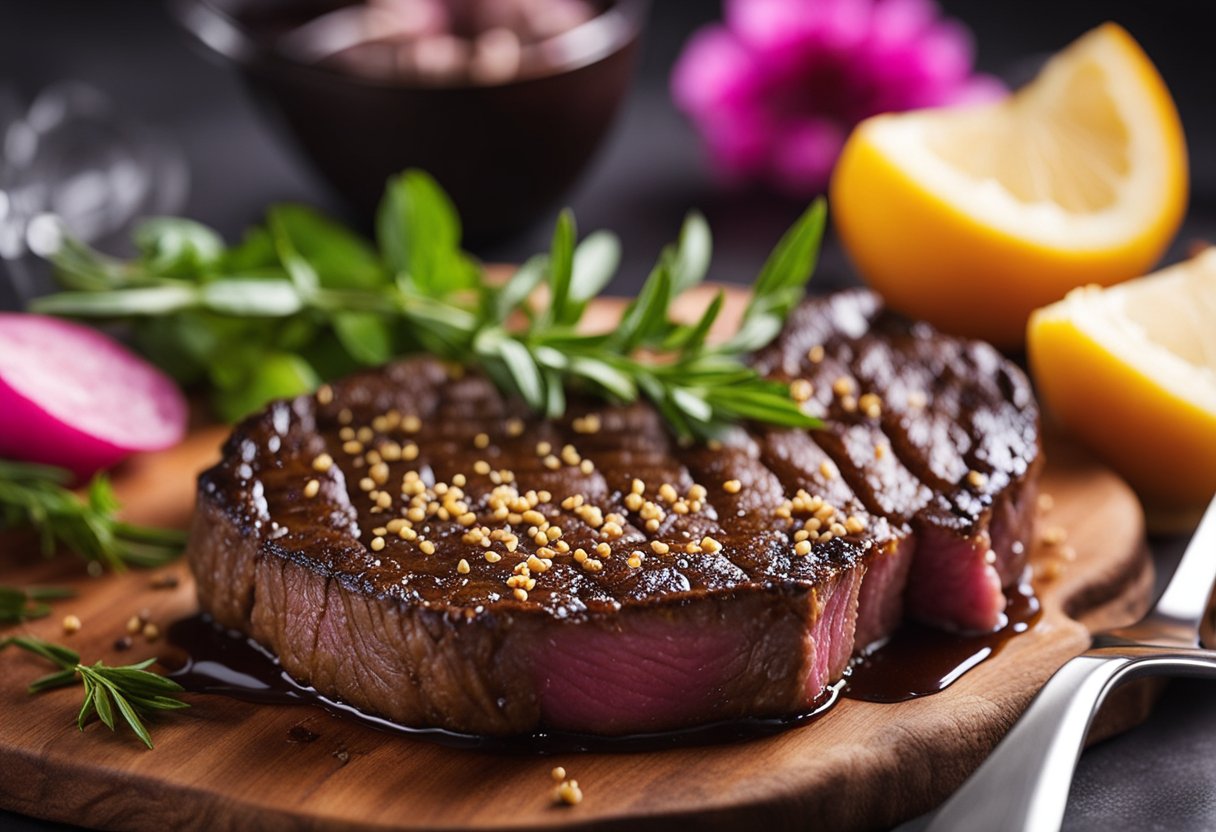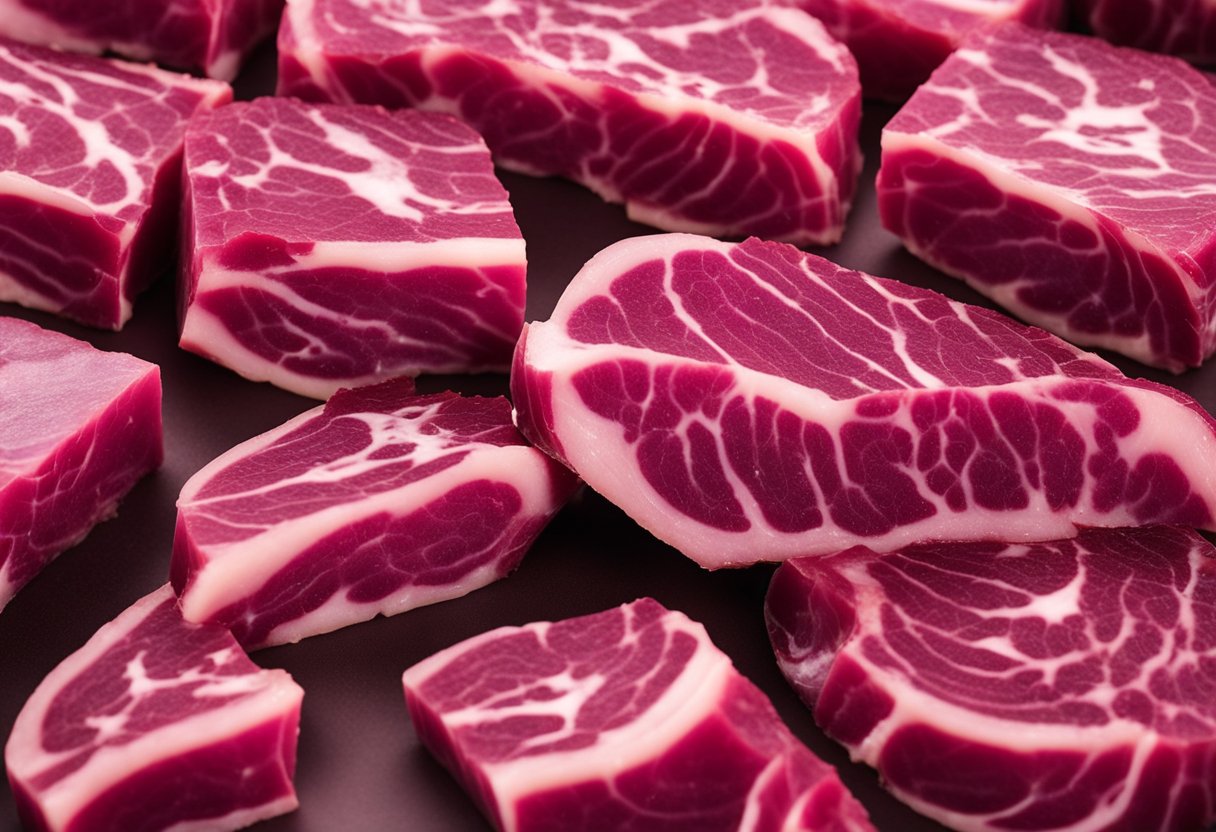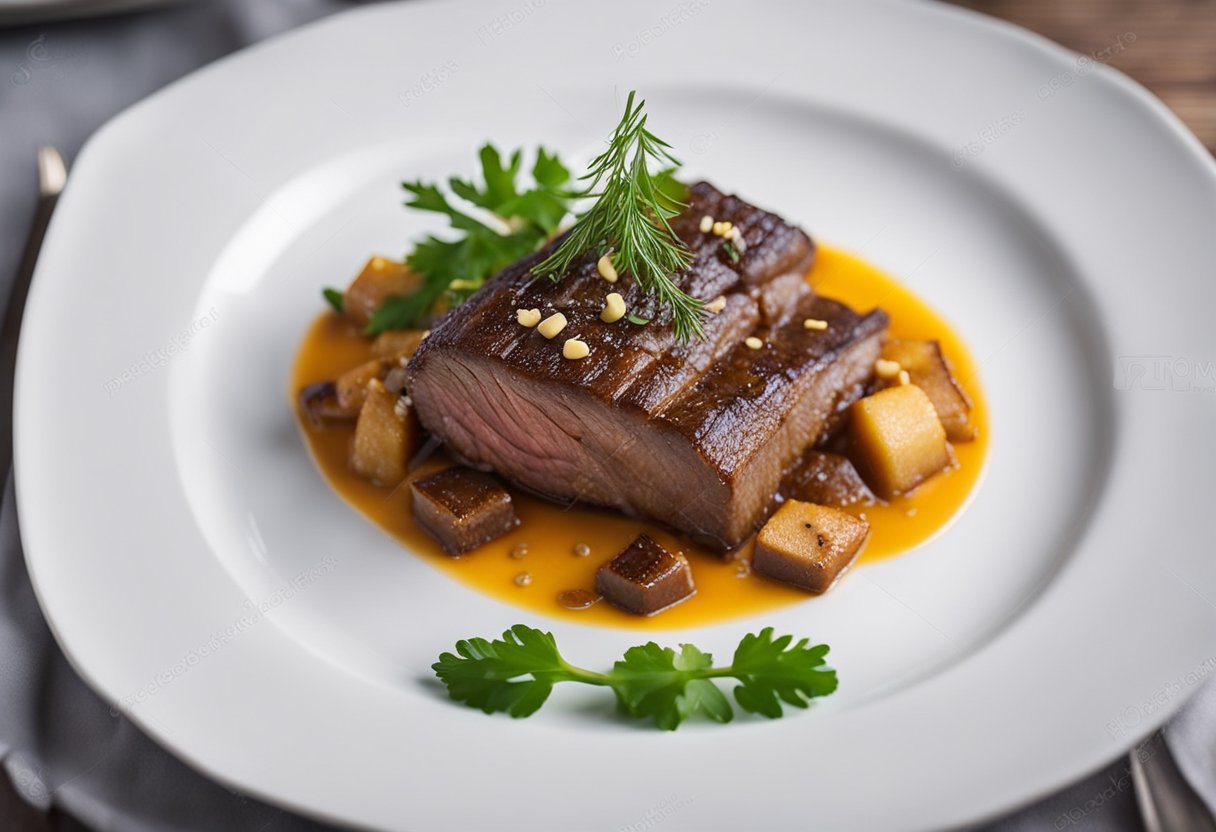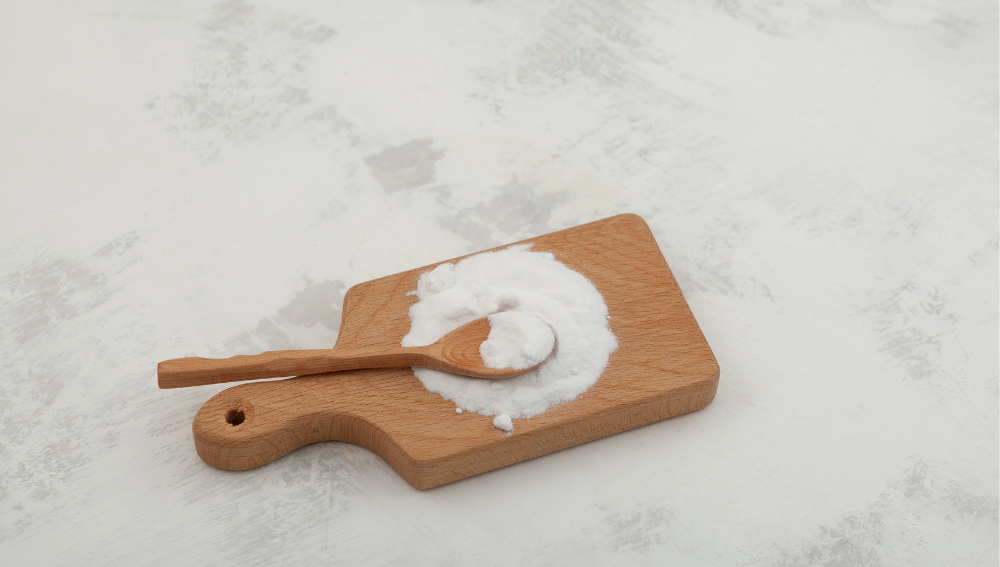As someone who enjoys trying new foods and exploring different culinary experiences, I’ve often wondered what venison tastes like.
Venison is a type of red meat that comes from deer, and it’s often praised for its unique flavor profile and nutritional benefits.
In this article, I’ll be diving into the taste and texture of venison, exploring how it compares to other meats, and sharing some tips for cooking and seasoning this delicious protein.

Understanding Venison Before we can dive into the taste of venison, it’s important to understand what it is and where it comes from.
Venison is a type of red meat that comes from deer, and it’s often hunted in the wild or raised on farms. Because deer are free-range animals that eat a variety of foods, venison has a distinct flavor profile that sets it apart from other meats.
In addition to its unique taste, venison is also a great source of protein, iron, and other important nutrients.
Key Takeaways
- Venison is a type of red meat that comes from deer and is praised for its unique flavor profile and nutritional benefits.
- Because deer are free-range animals that eat a variety of foods, venison has a distinct flavor profile that sets it apart from other meats.
- Venison is a great source of protein, iron, and other important nutrients.
Understanding Venison
As someone who has tried venison before, I can confidently say that it has a unique flavor that sets it apart from other meats.
Venison is a type of game meat that is obtained from deer, which are wild animals that feed on a variety of natural foods such as shrubs, herbs, and grasses.
One of the reasons why venison is becoming increasingly popular is because it is a great source of protein, iron, vitamins, and zinc.
In fact, venison is known to have higher levels of iron and zinc than beef, which makes it a great choice for people who are looking to increase their nutrient intake. Additionally, venison is low in fat, which makes it a healthier alternative to other meats.
When it comes to the taste of venison, it can be described as rich, gamey, and earthy. The taste is influenced by several factors such as the deer’s diet, age, and gender, as well as the region it comes from.
Some people might find the taste of venison to be too strong, while others might enjoy its unique flavor.
If you are planning to try venison for the first time, it is important to keep in mind that it is a lean meat that requires careful cooking to prevent it from becoming tough and dry.
Additionally, it is important to choose high-quality venison that is free from any gamey or off-flavors.
In summary, venison is a type of game meat that is obtained from wild deer. It is a great source of protein, iron, vitamins, and zinc, and is low in fat.
The taste of venison can be described as rich, gamey, and earthy, and is influenced by several factors such as the deer’s diet, age, and gender. When cooking venison, it is important to take care to prevent it from becoming tough and dry.
Taste Profile of Venison
As someone who has tried venison before, I can confidently say that it has a unique flavor that sets it apart from other meats. Venison has a distinct, gamey flavor that can be described as rich, earthy, and slightly sweet.
This is because deer are free-range animals that eat a variety of foods, including grasses, leaves, and even bark. These flavors make their way into the meat, giving it a pungent and musky taste that some people love.
The texture of venison is also different from other meats. It is tender and slightly chewy, which makes it a great choice for dishes like stews and roasts.
Because deer are active animals, venison is dense, dry, and firm meat. This makes it a great choice for grilling or searing, as it can hold up to high heat without falling apart.
One of the things that makes venison so unique is that its flavor profile is influenced by several factors. For example, the age, gender, and region of the deer can all affect the taste of the meat.
Additionally, the animal’s diet plays a significant role in determining the flavor of the meat. Deer that eat a diet of grasses and other vegetation will have a milder flavor than those that eat a more varied diet.
Overall, if you’re someone who loves trying new foods and experiencing different flavors, I would highly recommend giving venison a try.
Its distinct, musky flavor and tender texture make it a great choice for a variety of dishes, from stews and roasts to grilled steaks and burgers. Just be sure to cook it properly to bring out its best flavors and textures.
Comparing Venison to Other Meats
As someone who has tried many different types of meat, I can confidently say that venison has a unique taste that sets it apart from other meats.
While it is often compared to beef, pork, lamb, and mutton, there are some key differences in taste and texture that make it stand out.
Compared to beef, venison has a more intense and sweeter taste. It is also leaner and has a denser, firmer texture. This is because deer are free-range animals that are constantly on the move, which results in leaner meat.
Venison also tends to be more dry than beef, which means that it is important to cook it properly to avoid it becoming tough.
When compared to pork, venison has a much milder taste. Pork tends to have a stronger, more distinct flavor, while venison is more subtle.
Venison is also much leaner than pork, which means that it is a healthier option for those who are watching their fat intake.
Lamb and mutton are often compared to venison because they are both red meats that have a distinct taste. However, while lamb and mutton have a strong, gamey taste, venison is much milder. Venison is also leaner than lamb and mutton, which makes it a healthier option.
Elk and antelope are two other types of game meat that are often compared to venison. While they are similar in taste and texture, elk and antelope tend to be a bit milder than venison. They are also leaner than beef, which makes them a healthier option.
Overall, when compared to other types of meat, venison has a unique taste and texture that sets it apart. It is leaner, denser, and has a more subtle flavor than beef, pork, lamb, mutton, elk, and antelope.
If you are looking for a healthier, more flavorful alternative to traditional meats, venison is definitely worth trying.
Texture of Venison

As someone who has tried venison before, I can confidently say that the texture of venison is unique and different from other meats. The texture of venison can vary depending on several factors such as the age of the deer, the cut of meat, and how it was cooked.
Generally, venison is a lean meat, which means it has less fat compared to other meats like beef or pork. This can make the meat feel dry or tough if it is overcooked. However, when cooked properly, venison can be succulent and tender.
One of the reasons why venison has a unique texture is because deer are wild animals that roam freely in the forests. This means that they have more muscle and less fat compared to domesticated animals.
The muscles of wild animals work harder, which can result in a denser, chewier texture.
When cooking venison, it is important to keep in mind that it is a lean meat and can easily become dry or tough if overcooked. It is best to cook venison to medium-rare or medium to keep it tender and juicy.
Slow cooking methods like braising or stewing can also help to break down the tough fibers and make the meat more tender.
In summary, the texture of venison can be described as dense, chewy, and succulent when cooked properly. It is important to keep in mind that venison is a lean meat and can easily become dry or tough if overcooked.
Slow cooking methods and cooking to medium-rare or medium can help to keep the meat tender and juicy.
Cooking Techniques for Venison
When it comes to cooking venison, there are a few important things to keep in mind. Here are some tips for cooking venison that will help you get the best flavor and texture out of this delicious meat:
1. Cooking Methods
Venison can be cooked using a variety of methods, including grilling, roasting, braising, and sautéing. The method you choose will depend on the cut of meat you are working with and your personal preference.
For example, grilling is a great option for venison steaks, while braising is a good choice for tougher cuts like shanks or shoulder.
2. Seasoning
Venison has a unique flavor that can be enhanced with the right seasonings. Some popular options include garlic, rosemary, thyme, and juniper berries.
When seasoning venison, it’s important to keep in mind that less is often more. Venison has a delicate flavor that can be easily overwhelmed by too much seasoning.
3. Marinating
Marinating venison can help to tenderize the meat and add flavor. A simple marinade of olive oil, garlic, and herbs can work wonders for venison steaks or chops.
For tougher cuts like shanks or shoulder, a longer marinade with acidic ingredients like vinegar or wine can help to break down the connective tissue and make the meat more tender.
4. Cooking Temperature
Venison is best served medium-rare to medium. Overcooking can result in tough, dry meat. To achieve the perfect temperature, use a meat thermometer and remove the meat from the heat when it reaches an internal temperature of 130-140°F for medium-rare or 140-150°F for medium.
5. Resting
After cooking, it’s important to let the venison rest for a few minutes before slicing. This allows the juices to redistribute throughout the meat, resulting in a more tender and flavorful final product.
Marinating and Seasoning Venison
When it comes to marinating and seasoning venison, there are a variety of options to choose from. The right combination of flavors can enhance the natural taste of the meat and make it more enjoyable to eat.
Here are some tips and suggestions for marinating and seasoning venison:
Marinade
Marinating venison can help to tenderize the meat and add flavor. Some popular marinade ingredients include vinegar, mustard, olive oil, and various herbs and spices.
A marinade can be as simple as a mixture of olive oil, salt, and pepper, or it can be more complex with a variety of ingredients.
Herbs and Acorn
Herbs such as rosemary, mint, and bay leaves can add a fragrant aroma and a pleasant taste to venison. Acorn is another ingredient that can add a unique flavor to venison.
This is because deer often feed on acorns, and the flavor can be imparted into the meat.
Spices
Spices such as juniper berries, pepper, and other aromatic spices can also be used to season venison. These spices can add a depth of flavor and complexity to the meat.
Bacon
Bacon is a popular ingredient to wrap around venison cuts, as it adds fat and flavor to the meat. It can also help to keep the meat moist during cooking.
Salt
Salt is an essential ingredient when it comes to seasoning venison. It helps to enhance the natural flavors of the meat and can also help to tenderize it.
Overall, marinating and seasoning venison is a great way to add flavor and enhance the natural taste of the meat. With a variety of ingredients to choose from, it’s easy to find a combination of flavors that will suit your taste buds.
Venison Dishes
As a versatile meat, venison can be used in a variety of dishes. Here are some of my favorite ways to prepare and enjoy venison:
Venison Steak
Venison steak is a popular way to enjoy this meat. It has a rich, gamey flavor and is leaner than beef. Venison steak can be cooked in a variety of ways, such as grilled, pan-seared, or broiled. It pairs well with bold flavors like red wine, garlic, and rosemary.
Venison Burgers
Venison burgers are a great alternative to beef burgers. They have a unique flavor and are leaner than beef. Venison burgers can be seasoned with a variety of spices and herbs, such as thyme, sage, and cumin. They can be cooked on the grill, in a skillet, or in the oven.
Venison Tacos
Venison tacos are a delicious way to enjoy this meat. The gamey flavor of venison pairs well with the bold flavors of Mexican cuisine.
Venison can be seasoned with chili powder, cumin, and garlic, and then cooked in a skillet. It can be served in a tortilla with toppings like salsa, avocado, and cilantro.
Venison Chili
Venison chili is a hearty and flavorful dish. Venison can be used in place of beef in a traditional chili recipe. It pairs well with beans, tomatoes, and spices like cumin and chili powder. Venison chili can be served with cornbread or over rice.
Venison Meals
Venison can be used in a variety of other meals, such as stews, roasts, and stir-frys. It pairs well with vegetables like mushrooms, onions, and carrots.
Venison can be marinated in red wine or balsamic vinegar to add flavor and tenderness. It can also be slow-cooked in a crockpot for a tender and flavorful meal.
Overall, venison is a delicious and versatile meat that can be used in a variety of dishes. Its unique flavor and lean nature make it a popular choice for those looking for a healthier alternative to beef.
Preparing and Processing Venison
When it comes to preparing and processing venison, there are a few things to keep in mind. First and foremost, it is important to properly field dress the animal as soon as possible after harvesting it to ensure that the meat stays fresh and safe to eat.
Field dressing involves removing the internal organs and other non-meat parts of the animal, such as the bladder and the rectum.
This helps to prevent contamination of the meat with bacteria and other harmful substances. It is also important to remove any connective tissue or sinew from the meat, as these can be tough and unpleasant to eat.
Once the animal has been field dressed, it is important to age the meat for a period of time to allow it to tenderize and develop flavor.
This can be done by hanging the meat in a cool, dry place for several days, depending on the size of the animal. During this time, the meat will develop a thin layer of silver skin, which should be trimmed off before cooking.
When it comes time to process the meat, it is important to use a sharp knife and to work carefully to avoid wasting any of the meat.
This may involve cutting the meat into smaller pieces, removing any remaining connective tissue or silver skin, and grinding the meat to make sausage or burger.
Overall, preparing and processing venison requires some knowledge and skill, but with a little practice, it is possible to produce delicious and nutritious meat that is a great alternative to beef or pork.
Pairing Venison with Wine
When it comes to pairing wine with venison, there are a few things to keep in mind. Venison is a lean meat with a rich, gamey flavor that can be enhanced by certain types of wine.
I have found that red wine is the best choice for pairing with venison, with merlot and cabernet sauvignon being two of my personal favorites.
Merlot is a medium-bodied red wine that pairs well with venison because it has a smooth, fruity flavor that complements the gamey taste of the meat.
It has a lower tannin content than other red wines, which makes it a good choice for those who prefer a milder flavor. Merlot also has a slightly sweet finish that can help balance out the saltiness of venison.
Cabernet sauvignon is a full-bodied red wine that pairs well with venison because it has a bold, complex flavor that can stand up to the strong taste of the meat.
It has a higher tannin content than merlot, which gives it a more robust flavor. Cabernet sauvignon also has a slightly acidic finish that can help cut through the richness of venison.
When choosing a wine to pair with venison, it is important to consider the preparation method of the meat. For example, a roasted venison dish may pair better with a full-bodied cabernet sauvignon, while a grilled venison steak may pair better with a medium-bodied merlot.
In conclusion, when it comes to pairing wine with venison, red wine is the way to go. Merlot and cabernet sauvignon are two great options that can enhance the rich, gamey flavor of venison.
Just remember to consider the preparation method of the meat when choosing a wine to pair with it.
Health Benefits of Venison
As a lean protein source, venison offers many health benefits. Venison is low in fat, making it an excellent choice for those who are watching their fat intake. It is also high in protein, which is essential for building and repairing muscles.
In addition to protein, venison is a good source of iron, a mineral that is important for the production of red blood cells. Iron is also essential for maintaining energy levels and preventing fatigue.
Venison is also a good source of vitamins, including vitamin B12. Vitamin B12 is important for maintaining healthy nerve cells and red blood cells. It is also essential for DNA synthesis.
Another important nutrient found in venison is zinc. Zinc is important for maintaining a healthy immune system and for wound healing. It is also essential for proper growth and development.
In addition to these important nutrients, venison is also a good source of other minerals such as phosphorus, selenium, and potassium. These minerals are important for maintaining healthy bones, teeth, and muscles.
Overall, venison is a healthy and nutritious meat that offers many health benefits. Its low-fat content, high protein, and abundance of vitamins and minerals make it an excellent choice for those who are looking to maintain a healthy diet.
Factors Influencing Venison Taste

When it comes to the taste of venison, there are several factors that can influence it. As someone who has tried venison before, I can confidently say that the taste can vary depending on several factors.
Age of the Deer
One of the most significant factors that can influence the taste of venison is the age of the deer. Young venison has a milder and less gamey flavor than older venison.
The older the animal, the stronger the gaminess. This is because older deer have had more time to develop their muscles, which can result in a tougher and more flavorful meat.
Environment
Another factor that can influence the taste of venison is the environment in which the deer lived. Wild deer that have roamed free and eaten a natural diet will have a different taste than farm-raised deer that have been fed a controlled diet.
Wild deer may have eaten a variety of plants, which can give their meat a unique flavor.
Farm-raised vs Natural
Farm-raised deer are often fed a controlled diet, which can result in a less gamey flavor. However, some people prefer the taste of wild venison because it has a more complex flavor profile.
Adrenaline
The taste of venison can also be influenced by the amount of adrenaline in the animal’s system at the time of slaughter. If the animal is stressed or scared, it can release adrenaline into its muscles, which can result in a tougher and more gamey meat.
Overall, the taste of venison can vary depending on several factors, including the age of the deer, the environment in which it lived, and whether it was farm-raised or natural.
As someone who has tried venison before, I can say that it has a unique flavor that sets it apart from other meats like beef and pork.
Frequently Asked Questions
Is venison tastier than beef?
Venison has a distinct flavor that is often described as gamey, earthy, and slightly sweet. While some people prefer the taste of venison over beef, it ultimately comes down to personal preference.
Venison has a firmer, chewier texture than beef or other meat from domesticated livestock. It is not as juicy as meat from a cow, but most diners find it more flavorful.
What does elk taste like?
Elk meat is similar to venison, but it has a slightly milder flavor. It is often described as being sweeter and more tender than beef. Elk meat is also leaner than beef, making it a healthier alternative.
What does gamey taste like?
Gamey is a term used to describe the flavor of wild game meats such as venison, elk, and bison. It is often described as a musky, earthy, and slightly sweet flavor. Some people enjoy the taste of gamey meat, while others find it too strong.
What does bad venison taste like?
Bad venison can have a sour or rotten smell and taste. It can also have a slimy texture. If you suspect that your venison has gone bad, it is best to err on the side of caution and throw it out. Eating spoiled meat can lead to food poisoning and other health problems.
What does bear taste like?
Bear meat is often described as having a strong, gamey flavor. It is similar to venison in texture and taste, but it can be more intense. Bear meat can also be tough and chewy, so it is often slow-cooked to make it more tender.
What meat is deer similar to?
Deer meat is similar to other game meats such as elk, bison, and moose. It has a distinct flavor that is often described as gamey, earthy, and slightly sweet. It is also leaner than beef, making it a healthier alternative.







